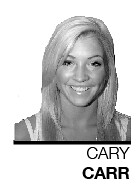 In response to a “fat joke” made by a doctor, Cary Carr argues that it is never OK to joke about America’s serious obesity epidemic.
In response to a “fat joke” made by a doctor, Cary Carr argues that it is never OK to joke about America’s serious obesity epidemic.
Approximately one-third of U.S. adults are obese, according to the Centers for Disease Control and Prevention. Moreover, our country’s prevalent weight problem has now surpassed smoking as the leading cause of preventable death. With such a large number of Americans suffering, both emotionally and physically from being overweight and obese, it’s ironic that a doctor–the person hired to treat patients and guide them on the path to healthy lifestyles–is poking fun at obesity.
In a recent article, philly.com reported that the University of Pennsylvania orthopedic surgeon, John D. Kelly IV, included several crude jokes in a monthly humor column he writes for a medical trade magazine.
“You should worry about performing surgery on the super-sized if there is a comma in your patient’s body weight,” is just one example of Kelly’s many corny, and unnecessary, one-liners.
Kelly, who used to work for the Temple University School of Medicine, clearly mixed up his part-time comedy gig with his serious, and respected, role in the health field. And while he has made several apologies, including an interview with formerfatdudes.com, where he admitted that he “blew it,” it doesn’t lessen the severity of his actions.
It also doesn’t help reducing the negative stigma against obese individuals. The obese and overweight population face discrimination, as well as negative attitudes in the job market, in mass media portrayals, amongst their peers and apparently now even in health institutions.
Gary Foster, director of the Center for Obesity Research and Education, said that obese and overweight people face several stereotypes, including that they are lazy and weak and have a lack of will power or discipline.
“It strikes me as very odd in this politically correct environment that it’s still OK to poke fun at overweight people in very public places,” Foster said. “It’s the last socially accepted form of bigotry.”
And unfortunately, weight discrimination happens often. According to a 2007 study done at Yale University, doctor prejudice begins when a female patient is just 13 pounds overweight and when a male is 75 pounds overweight.
The Yale study indicated that healthcare professionals have many “negative attitudes” towards obese people including the misconceptions that they are “lazy, noncompliant, undisciplined and have low willpower.” And patients notice these negative attitudes with more than half of obese women reporting “inappropriate comments” about their weight from doctors.
Although there is certainly some control level a person has to change their weight, Foster said most people don’t realize the largely biological component that comes along with being overweight or obese.
“Part of the problem is that people are just not educated,” Foster said. “People think you can weigh what you want.”
Foster said regardless of whether it is “their fault” or not, discrimination is never OK.
Instead of reinforcing these negative stereotypes and making obese and overweight individuals feel more hopeless about their present conditions, healthcare professionals should be encouraging their patients, offering valuable health advice and furthering their education on the prevention and treatment of obesity.
The Obesity Society has the right idea. They are not only advocating for programs to prevent obesity, but also helping to ensure obese patients have access to quality medical care and attempting to increase funding of obesity research.
Maybe Kelly should jump on board and support the Obesity Society as well as other organizations that not only support, but help to advance the fight against obesity. This could help make up for his ignorant and careless jokes a lot more than a few written apologies will.
Cary Carr can be reached at cary.carr@temple.edu.



Be the first to comment